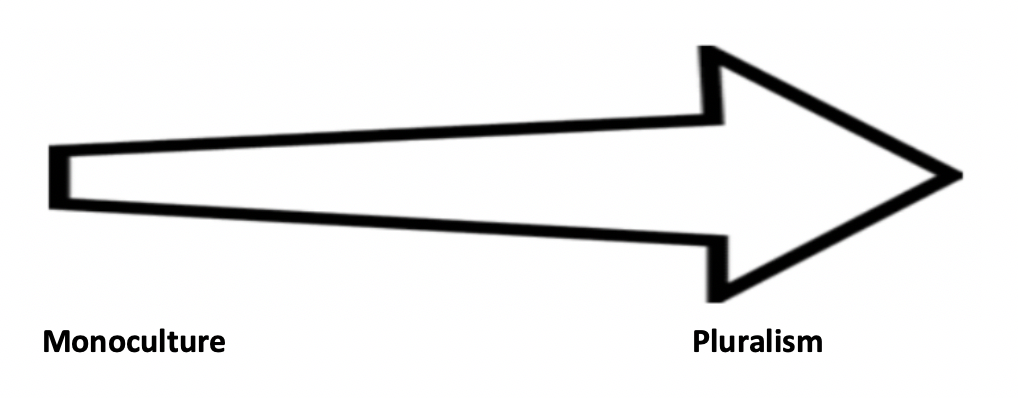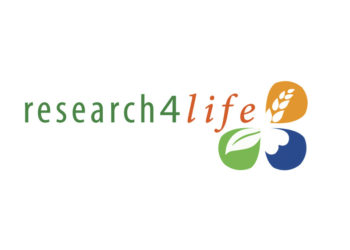Looking back on this piece about the future prospects for a diverse scholarly publishing ecosystem, it’s kind of hard to believe that I wrote it only two and a half years ago. Sad to say, the world at large has not become a place more tolerant of pluralism and ideological diversity than it was in 2020. Here in the US, at least, we continue to be whipsawed politically and culturally between a North Korea-style cult of personality and an increasingly McCarthyesque regime of thought policing. And hey — just about everyone is banning books! To what degree do we want to let the scholarly communication ecosystem become a reflection of our larger society’s increasing intolerance of differing viewpoints, practices, and models?
Will the Future of Scholarly Communication Be Pluralistic and Democratic, or Monocultural and Authoritarian?
Over the past twenty years I’ve engaged in more discussions, and read more articles and reports, and listened to more presentations about the present and future of scholarly communication than I can possibly count. For me, each of these conversations, documents, and presentations serves as a single point in a large and growing mass of data. Looking at it in the aggregate, this data set reveals certain patterns. One of the patterns that has recently become clear to me is that the scholarly communication community — a huge, globally and ideologically diverse group of people and organizations — is struggling collectively to make a choice between two mutually incompatible options. The difficulty of that choice is compounded by several factors, one of which is the fact that neither of these mutually incompatible options is perfect, and yet our community will eventually, inevitably, choose one of them over the other. Another factor contributing to this difficulty is the fact that there is not a universal willingness to discuss openly the necessity of the choice or even the reality of it.

At this point we’d better acknowledge an important truth: that we need to be careful to avoid false choices. Life is full of them. For what it’s worth, I’m living proof that the choice between aligning oneself with the political Left and with the political Right is a false one; there’s no reason why you can’t agree with the Left on some issues and with the Right on others. Also that there’s no need to choose between being a dog person and being a cat person, and that there’s no need to choose between liking classical music and liking reggae.
But just as it’s important to avoid false choices, it’s also important — essential — to acknowledge that not all choices are false. Sometimes we really do have to choose between two things. This is the case when one option rules out or can’t logically coexist with the other one. One such situation is the one that I want to discuss here.
The struggle that is playing out right now within the scholarly communication ecosystem is the struggle to choose between pluralism and monoculture.
In the pluralistic scenario, the scholarly communication ecosystem embraces some mixture of open access (OA) and toll access models. In the monocultural scenario, the scholarly communication ecosystem embraces only OA, and eliminates toll access altogether. (Theoretically, of course, it would be possible to have an all-toll-access scenario as well, but that hasn’t been a realistic possibility for years. OA is here to stay and there is no reason at all to believe that it will ever go away, or that it should.)
We have to choose between these scenarios because as a matter of simple logic, they can’t coexist; one of them will eventually win and one of them will lose.
Not all choices are false. Sometimes we really do have to choose between two things.
It’s important to note that most of the people and organizations promoting and advocating for either of these scenarios are fully in favor of open access. Although I’ve heard credible rumors of genuine opposition to OA within certain segments of the scholarly communication ecosystem, I have never personally encountered any organization that opposes it in principle, or more than a tiny handful of individuals who oppose it. Even those organizations most commonly held up as anti-OA boogiemen (*cough* Elsevier *cough*) tend strongly to have demonstrated their support for OA in the most concrete of ways: by, you know, enthusiastically adopting it — and, in some cases, by having done more to advance it than most other groups who are in favor of it.
The problem is that when those who support the monocultural scenario talk about OA, what they often actually mean is “universal and mandatory OA.” When someone is characterized as “anti-OA,” I find that what that means most often is not that the person or organization in question actually does oppose OA, but rather that they are willing to accept other access models in addition to OA and therefore don’t support the pursuit of a scenario in which OA is the only option available.
What this means — and it’s absolutely crucial that we be clear on this — is that the choice our community is struggling to make is not a choice between OA and not-OA. The choice is between a pluralistic and democratic system and a totalistic and authoritarian one.
Anticipating that someone is going to say, “there you go again, creating a false dichotomy and ginning up a conflict where none exists,” I have to emphasize again the difference between false dichotomies and true ones. Open access vs. toll access is a false dichotomy; you can have (and indeed we do now have) a system that is characterized by both open access and toll access models. So that’s not the choice we’re currently struggling with. What we are struggling with is the choice between universal and mandatory OA and non-universal and optional OA. That’s not a false dichotomy, but a real and logically inescapable one: you can’t simultaneously have universal and non-universal OA; OA can’t simultaneously be mandatory and optional.
Those who are inclined to resist binaries in principle might be tempted to think that there’s a continuum of values between monoculture and pluralism, one that looks like this:

But in fact, this isn’t true. In reality, there’s only a spectrum of pluralism. The difference between monoculture and pluralism is binary: either you have one model, or you have more than one model; that’s the binary distinction. Once you have more than one model, you might have few or you might have many; that’s the spectrum value.
So a better representation of the discontinuous spectrum from monoculture to pluralism would look more like this:

If we can’t have both an OA monoculture and a pluralistic culture of OA and non-OA models — if, in other words, a choice between those two options is logically inevitable — how will the choice be made?
I suggest that this question is an important and urgent one — even more important and urgent than the question of which option the scholarly communication community will ultimately choose.
The question “How will we choose?” is more important than the question “What will we choose?” because the answer to the “how” question will shape much more than just the access landscape. The answer to that question has implications not only for the processes we will follow, but also for who will be given the choicemaking power. You can’t separate the process question from the power question; will the power to choose between these scenarios be placed more or less democratically in the hands of all members of the ecosystem, all of whom have some degree of influence over the outcome, or will that power be granted only to a subset of the ecosystem? If the former, what might that democratic decision-making process look like? And if the latter, who will decide who gets the power?
The scholcomm community is not struggling to choose between “OA” and “not OA,” but between “universal and mandatory OA” and “non-universal and optional OA.”
A democratic approach would involve leaving authors, institutions, funders, publishers, and other members of the scholcomm ecosystem free to consider multiple options and choose between them, thus allowing them to vote with their feet. I know it’s not very hip these days to speak positively of free markets, but the reality is that while free markets do some things quite poorly, they do other things quite well. One of the things a free market of ideas can do quite well is demonstrate the diversity of beliefs and desires of a community. When members of that community are genuinely free to choose for themselves between two mutually exclusive options, we’ll usually get a pretty good idea of what the majority of the community really wants and believes is right.
Another option is for powerful individuals or groups within the community to use their power to make choices on behalf of everyone else. Is there anyone in the scholarly communication ecosystem that has that kind of power?
Yes, of course there is. Those who wield the most institutional power in the system are funders and governments. Funders control the money that is the lifeblood of scientific research, and governments are able to impose their will by legislation and regulation.
Are either governments or funders pushing for mandatory universal open access? Some certainly are, but not many. Despite the publicity surrounding public-funding mandates like Plan S and private-funding mandates like those of the Gates and Ford Foundations, relatively few national or private funders — so far — seem inclined to impose such requirements on the researchers they support. In the US, only those two private funders (though large ones, certainly) require immediate and full OA publication; the largest government-based funders require only public access (making articles free to read but not necessarily free to reuse) and — as of this writing, anyway — allow embargoes of up to a year. Without significantly more global momentum in the direction of OA on the part of those who have power over authors, a universal flip to mandatory OA will remain a theoretical end point towards which we move without ever actually reaching it.
What currently looks much more likely is a future scenario in which different countries and funding agencies adopt varying kinds of open access policies, depending on the needs, goals, and preferences of their constituents — and in some cases adopt no explicit open access policies at all, leaving institutions, disciplines, and authors with the leeway to determine for themselves what they believe makes the most sense.
Without significantly more global momentum in the direction of OA on the part of those who have power over authors, a universal flip to mandatory OA will remain out of reach.
One objection one might raise to this scenario is: what about the readers? What about members of the general public, who have the least power of all in the scholarly communication ecosystem and whose access to (and freedom to reuse) scholarly content would be determined entirely by others? Shouldn’t they have a voice?
They should, of course, and they do. If they believe that the government should (or shouldn’t) put laws or regulations in place making open access mandatory, then they need to make their voices heard — in democratic countries they have representatives in government who need their votes and whose job is to legislate and regulate for the good of their constituents and of the country. Only some of them will get what they want, of course, because that’s how democracy works. If they think that funders should (or shouldn’t) condition their support for research on the willingness of grantees to adopt open access, then they should make those opinions known to them — though individual citizens probably can’t expect big private foundations to care much what they think, since those foundations are only vaguely accountable to the citizenry.
What this all boils down to is a responsibility on each of our parts, both as individuals and as members of organizations, to assert ourselves and make our voices heard (whatever our perspectives or positions may be) and not to allow ourselves to be silenced or intimidated by those who wish to decide for us what our future must look like (whatever their perspectives or positions may be). One way or another, the scholarly communication ecosystem is going to choose between pluralism and monoculture. What that choice will be, and how the choice will be made, is up to us — unless, of course, we allow those in power to decide for us.
Discussion
10 Thoughts on "Revisiting: Will the Future of Scholarly Communication Be Pluralistic and Democratic, or Monocultural and Authoritarian?"
It seems to me that the market will decide which model(s) will be adopted.
That would be a safe assumption, if scholarly communication were a simple and straightforwardly competitive marketplace. But it isn’t, and its participants don’t always have the option of making free choices as to how they’ll behave in it.
“…but the reality is that while free markets do some things quite poorly, they do other things quite well. One of the things a free market of ideas can do quite well is demonstrate the diversity of beliefs and desires of a community.”
What things do you think a free market of ideas does poorly in this context?
Any casual glance at the world of social media will answer this question pretty handily, I think. In a free marketplace of ideas — especially one in which barriers to entry are exceptionally low — you’re going to have a lot of intellectual noise and a high risk that appealing nonsense (some of which is not just nonsensical but also dangerous and damaging) will gain a significant toehold and metastasize in the body politic. To me, this reality seems to demonstrate something a free marketplace of ideas does very well (making visible the diversity of beliefs and desires in a community), while also demonstrating something it does poorly (preventing the metastasis of dangerous nonsense). Freedom always entails risk, and freedom of information and expression is no exception to that rule — which, of course, doesn’t mean it isn’t worth it.
Thanks for that. As a follow up, what do you think a free market of ideas does poorly in terms of “authors, institutions, funders, publishers, and other members of the scholcomm ecosystem” voting with their feet to choose which modes in which to publish?
In the paragraph you’re referring to, I didn’t actually suggest that a free market of ideas has a bearing (whether positive or negative) on authors’ publishing choices as such. As an illustration of how freedom of choice can work, I suggested that a free market of ideas does a good job of showing “the diversity of beliefs and desires of a community.” I then narrowed that concept to the idea of a choice between “two mutually exclusive options” (a related but different scenario from a “free market of ideas”) and suggested that when people are able to choose freely between them, “we’ll usually get a pretty good idea of what the majority of the community really wants and believes is right” (with regard to those two options).
In the context of publishing, authors are able to “vote with their feet” when there are multiple publishing options, and when their ability to choose between those options isn’t artificially constrained. In this scenario, whether one feels that the “market” functions well is going to depend largely on what outcomes one considers acceptable. Anyone who believes there’s only one acceptable way to publish is liable to be unsatisfied by a system in which authors can publish in any way they want. Those who see multiple ways of publishing as acceptable are more likely to be satisfied with that scenario.
Thanks Rick for this inspiring article.
As long as there is one single author in this world who wants to publish his or her work other than in OA, the plurality in publishing would have to remain. Otherwise, we cannot speak anymore about academic freedom which is the foundation of science.
Since 2020, the forces of monoculture have made significant gains, including UNESCO’s Open Science policy, big growth in the Open Research Funders Group, big growth in transformative agreements, and continued lobbying success by SPARC and others for creating a monocular vision of OA. If I were able to insert a picture here, the growth of your monoculture vs. pluralistic scholcomm future wouldn’t be represented by arrows but instead by a walled city surrounded by scattered huts. The wealthy monoculture city dwellers—the only ones who can afford the all-APC solution that fuels the monoculture—will build a city for sharing and data access that the “rural” researchers will be able to see but not affect. These rural researchers will become voiceless observers, left to their own devices to fight for visibility, funding and relevance (“let them find diamond OA solutions” will become the new “let them eat cake”). The irony here is that the entire foundational premise of OA was to lower barriers to access and improve equity. Along our journey, this community took a wrong turn down the all-APC road. Hopefully we will have the strength to admit that we took a wrong turn so we can double back and continue looking for OA solutions that will actually work for everyone everywhere (regardless of whether these end up being monocultural solutions or plural—although given the vast diversity of needs and realities throughout the world, plural is probabaly the only workable option).
Without explicit acknowledgment, this discussion appears to be about scholarly communication in journals, not in books, because I do not see anywhere a strong movement toward monoculture in monograph publishing. Are funding bodies now requiring OA for publication in not just the STEM fields but in HSS fields? One cannot speak about the scholarly communication ecosystem by ignoring monograph publishing.
Back in the day I felt compelled to speak out after the BOAI initiative because it totally ignored book publishing, and eventually I drafted the Statement on Open Access (2007) for the AAUP (now AUP) to draw attention toward the need for OA efforts in monograph publishing that had lagged far behind the OA initiatives in STEM journal publishing. I frankly do not see a monoculture ever deveiopinbg for scholarly monographs if only because some of those monographs turn out to be very successful commercially. One case in point is Richard Rorty’s book Philosophy and the Mirror of Nature (1979), which I acquired for Princeton University Press and which went on to sell well over 100,000 copies and catapulted its author into the ranks of major public intellectuals. I’m sure John Rawls’s classic A Theory of Justice (Harvard, 1971) has sold hundreds of thousands of copies by this time. Authors of such books should have the right to benefit from such (probably unanticipated) commercial success, which a strict OA regime would deny to them. Hence, IMHO, there is no choice to be made in the scholarly community when it comes to book publishing by faculty members.
The reason I didn’t “acknowledge” that my discussion was about “scholarly communication in journals, not in books,” is because that’s not the case; my discussion was not, in fact, limited to journals. The choice I discuss in this piece does apply to the whole scholcomm ecosystem across all modes of publication.
Of course there’s a choice to be made about publishing models for books by faculty members. You’re proposing that the correct choice is obvious and/or inevitable, and you may well be right. But not everyone agrees with you. For example, cOAlition S has — for what it’s worth — publicly expressed its intention to achieve “progress towards full open access for academic books as soon as possible.” (I interpret “full open access” in this context to mean “open access for all scholarly books,” but if someone from cOAlition S wants to correct my understanding, please do.) A fair number of scholarly authors seem to agree, at least according to a 2019 study by Ros Pyne et al., which surveyed scholarly authors and found (among other interesting things) that a majority of them either agreed or strongly agreed with the statement “all future scholarly books (monographs, edited collections) should be made accessible via open access” (see page 30).
And of course, lots of scholarly books are OA already. So clearly, a choice must and will be made: will we continue with a scholcomm ecosystem (including book publishing) that is characterized by a diversity of access models, or will we eventually transition to an ecosystem that allows only OA publishing (including for scholarly books)?



